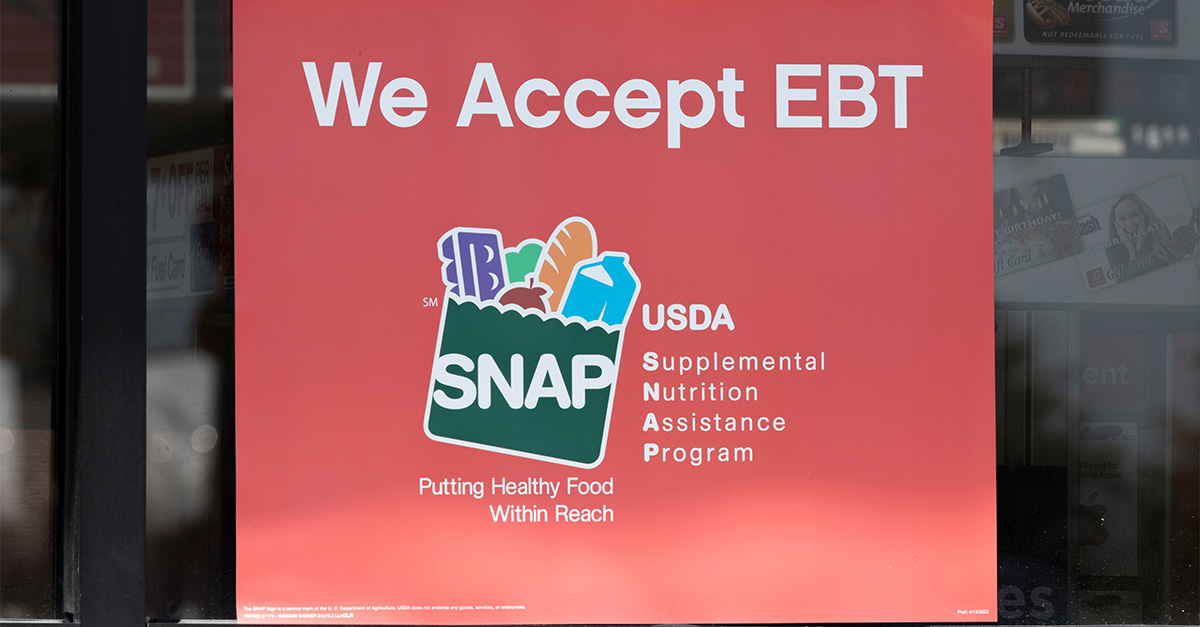


Get a free copy of Parental Rights & Education when you subscribe to our newsletter!

“The question isn’t if the poor should be helped, but how should the poor be helped. For that answer, the Bible, and not trite progressive dogmas, should be our guide. And with the Bible as our guide, it’s obvious that a sprawling welfare state — the heartbeat of this ‘liberal social vision’ — should be tossed overboard and left to drown.”
–JASON MATTERA
Forced redistribution of wealth is unjust and unbiblical. Or better yet, it’s unjust because it is unbiblical.
And unbiblical it is.
The Bible offers clear directives to Christians as to how to help those under financial distress, and none of those directives involve “social justice” shakedowns from government reps who use poverty as a pretext to expand power and line federal agencies with taxpayer cash.
Rather than view civil government as God’s instrument to keep the peace and maintain order — the outline given in Romans 13:1-6 and 1 Peter 2:13-14 — liberal Christians have expanded its role to be a paternalistic provider as well.
To these folks, there is no limiting principle that governs the reach of civil government if the words poor, widow, and orphan are repeated enough times in a sentence.
Anything goes!
Case in point: after the glorious ruling striking down Roe vs. Wade earlier this summer, Christianity Today published an essay that scolded the “individualistic politics of modern American conservatism” that “resists [a] liberal social vision.”
The article was titled, “Who Pays the Price for Crisis Pregnancies?” It was part of the publication’s post-Roe coverage which, as we documented here, calls for rapidly expanding the welfare state.
This “liberal social vision,” according to them, entails “transferring the costs of crisis pregnancies to society rather than solely to individual women.” It is a “vision,” they lament, that has been obstructed by “the political alliances pro-lifers made with the Republican Party.”
Those of us unwilling to go along with this “vision” are accused of not accepting “social responsibility for the less fortunate” and “not accord[ing] well with the Bible’s hundreds of exhortations to seek justice for the poor.”
If I may quote Joe Biden — “Malarkey!”
The question isn’t if the poor should be helped, but how should the poor be helped.
For that answer, the Bible, and not trite progressive dogmas, should be our guide.
And with the Bible as our guide, it’s obvious that a sprawling welfare state — the heartbeat of this “liberal social vision” — should be tossed overboard and left to drown.
Here are five ways to think about poverty from a biblical perspective.
To begin with, not all poverty is created equal.
Some people are poor due to circumstances beyond their control, and others are poor because they are lazy.
This latter category, those who refuse to govern themselves responsibly, don’t deserve a penny from us.
The Apostle Paul was explicit on this point:
“For even when we were with you, we would give you this command: If anyone is not willing to work, let him not eat.”
–2 Thessalonians 3:10
Christians, therefore, should exercise judgment on who receives relief instead of doling it out indiscriminately. Same goes for the nonprofit institutions. Able-bodied people who refuse to work should be turned away when they come begging.
The most important type of government is self-government, and those who don’t accept responsibility for their own actions deserve their destitution, and it isn’t un-Christian to say so.
“How long will you lie there, O sluggard? When will you arise from your sleep? A little sleep, a little slumber, a little folding of the hands to rest, and poverty will come upon you like a robber, and want like an armed man.”
–Proverbs 6:9-11
As already noted, there are persons who have immediate financial needs through no fault of their own, and they merit our help. But there is a hierarchy of who picks up the tab, and that hierarchy begins in the home and the family.
The local welfare office should be at the bottom of the list.
And really, it shouldn’t be on the list at all:
“But if anyone does not provide for his relatives, and especially for members of his household, he has denied the faith and is worse than an unbeliever.”
–1 Timothy 5:8
We are obligated take care of those under our roof and not foist them as burdens on to others. If we wash our hands of this obligation, we have literally turned our back on God.
Of course, there will be needy individuals who don’t have families who can help or who may be unwilling to help.
That’s where the Church should step up. But here, too, there’s a pecking order
As Christians, our first commitment is to those in the local church:
“So then, as we have opportunity, let us do good to everyone, and especially to those who are of the household of faith.”
–Galatians 6:10
And if this support becomes a regular feature, certain qualifications must be met, especially for “widows.”
“Let a widow be enrolled if she is not less than sixty years of age, having been the wife of one husband and having a reputation for good works: if she has brought up children, has shown hospitality, has washed the feet of the saints, has cared for the afflicted, and has devoted herself to every good work.”
–1 Timothy 5:9-10
It doesn’t mean we neglect others within the community; it means we have a practical framework by which to prioritize our care, as resources aren’t unlimited.
Scarcity is a thing.
One of the many problems with the welfare state is that it displaces the natural flow of such scarce resources. Instead of using our good judgement to subsidize anti-poverty initiatives directly — which would be far more targeted, efficient, and where we could provide better oversight — we are forced to fund the anti-poverty initiatives that some faceless bureaucrat has deemed essential, initiatives that are inefficient, lack accountability and cause harm — to both the individual and to the community.
Christians are exhorted to help those in a pinch when it is in our power to do so. If that’s not evident by now, here are two verses to hammer home the point:
“But if anyone has the world’s goods and sees his brother in need, yet closes his heart against him, how does God’s love abide in him?”
–1 John 3:17
“If a brother or sister is poorly clothed and lacking in daily food, and one of you says to them, ‘Go in peace, be warmed and filled,’ without giving them the things needed for the body, what good is that?”
–James 2:15-16
Notice something about these passages, and the many more like it?
These verses are directed at individuals and churches; they are not directed at public officials.
This is an important distinction.
While charitable giving should be a part of the normal Christian life, the Bible doesn’t impose civil penalties for failing to engage in this activity.
In other words, “charity by coercion” is nowhere found in Scripture. In fact, the Bible flat-out rejects that model:
“Each one must give as he has decided in his heart, not reluctantly or under compulsion, for God loves a cheerful giver.”
–2 Corinthians 9:7
For the Christian, “welfare” can be thought of similarly to “tithes and offering.” Naturally, we should give our tithes and offering. We are expected to do so, and if we don’t, we enact God’s displeasure. What we don’t enact, however, is a punishment from government authorities, and that’s because the area of “tithes and offerings” is outside of their jurisdiction.
As is welfare — it’s outside the jurisdiction of civil government.
To use the numerous biblical verses encouraging generosity as a basis to enlarge the size and scope of the federal government, as Christianity Today does, is to pawn off one’s own duty as a believer to 9-5 pencil pushers in D.C. and hope for the best.
One of the reasons why “public welfare” is outside the jurisdiction of civil government is because government doesn’t create wealth; it can only confiscate it in the form of taxation. And high taxation, the kind that is needed to finance today’s government paternalism, is oppressive by nature.
Remember when Israel demanded a king so that they could emulate all the other nations?
Samuel’s response is instructive.
He tries to dissuade the Israelites from replacing God as their king because an earthly ruler would inevitably lead to tyranny.
Here’s part of his warning to the Jewish elders:
“He will take your daughters to be perfumers and cooks and bakers. He will take the best of your fields and vineyards and olive orchards and give them to his servants. He will take the tenth of your grain and of your vineyards and give it to his officers and to his servants. He will take your male servants and female servants and the best of your young men and your donkeys, and put them to his work. He will take the tenth of your flocks, and you shall be his slaves.”
–1 Samuel 8:13-17
Catch that?
Be careful what you ask for, Samuel cautions, because a king will exact more from you than God does. And not only will he exact more from you than God does, but he’ll reallocate your goods to his favored constituency, as in “he’ll take a tenth of your grain and of your vineyards and give it to his officers and to his servants…He will take the tenth of your flocks, and you shall be his slaves.”
Samuel describes this forthcoming reality as tyranny. It’s not hard to see why. Political leaders should never compel more from us than what God requires.
To do so is to boast, “I call the shots,” a boast that only the Creator Himself can make.
Yet that’s where we find ourselves today.
The ruling class is playing “substitute god,” exacting from us far more than 10 percent through rapacious taxation and unbridled wealth redistribution. We are viewed, not as God’s stewards to advance His kingdom, but as serfs whose very existence is to promote the agenda of the State, for the State.
What Christianity Today hails as a “liberal social vision,” the Bible rejects as slavery.
The welfare state took generations to build up, and it will take generations to tear down.
But make no mistake — it should be torn down.
Follow Jason on Twitter! @JasonMattera
Ready to dive deeper into the intersection of faith and policy? Head over to our Theology of Politics series page where we’ve published several long-form pieces that will help Christians navigate where their faith should direct them on political issues.
Christian conservative news and issues that matter. Curated just for you!
